#20th Century Cincinnati
Text
Deco Doings - February, 2023
Winter by William Welsh, 1931. Image from Pinterest.
New York Adventure Club
Italian Futurism, Part II: Embracing Modern Sport, Flight, & War (On Line Event)
Friday, February 3, 2023 1:00 PM – 2:30 PM (EST)
New York Adventure Club
The Golden Age of Luxury Ocean Liners (On Line Event)
Tuesday, February 7, 2023 5:30 PM – 7:00 PM (EST)
Chicago Art Deco Society
Feeding the Art Deco…

View On WordPress
#1939-1940 New York World&039;s Fair#20th Century Cincinnati#Art Deco Festival - Napier#Art Deco Society of New York#Art Deco Trust#Auburn Cord Duesenberg Automobile Museum#Chicago Art Deco Society#Mid-Century Modern Show#National Jazz Museum in Harlem#New York Adventure Club#Paul Revere Williams
6 notes
·
View notes
Text
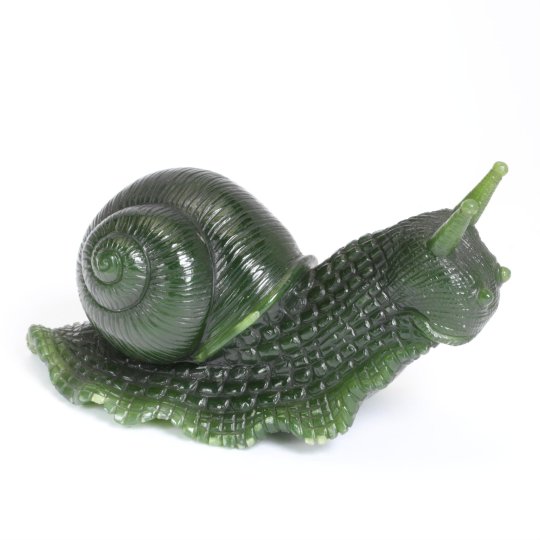
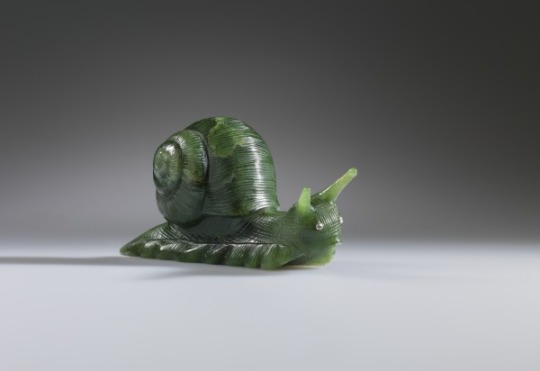
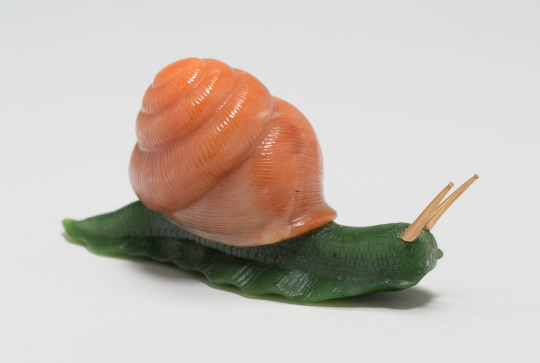
For a slow Sunday here are some Fabergé nephrite jade snails from Russia:
Carl Fabergé, late 19th/early 20th century, carved nephrite jade, 4.8 x 8.1 x 3.2 cm, Victoria and Albert Museum
Fabergé Workshop, c. 1900, carved nephrite jade with diamond eyes, 5.5 x 12.3 x 4.1 cm, Cincinnati Art Museum
Fabergé Workshop, c. 1885-1905, carved nephrite jade with rose aventurine quartz shell and gold tentacles, 4.9 × 4.8 × 10.8 cm, The Art Institute of Chicago
#Fabergé#Russian art#decorative arts#figurines#jade#nephrite#gemstones#carving#19th century art#20th century art#Art Nouveau#snail#snails#Victoria and Albert Museum#Cincinnati Art Museum#Art Institute of Chicago#animals in art
585 notes
·
View notes
Text

A water merry-go-round to assist children learning to swim at their school in Cincinnati, Ohio - 1914
#swimming#swim lessons#cincinnati#1914#20th century#nostalgia#early 20th century#water merry-go-round
2 notes
·
View notes
Text
Uncle Rob and the hotel business [part 3]
Continued from part 2
At the same time, Rob was defending the interests of the hotel industry before the state legislature as the continued Manager, Vice-President, and Director of the Grand Hotel [10] This is no surprise as he was a chairman for the second congressional district of Ohio for the American Hotel Association and attended the association's meeting.
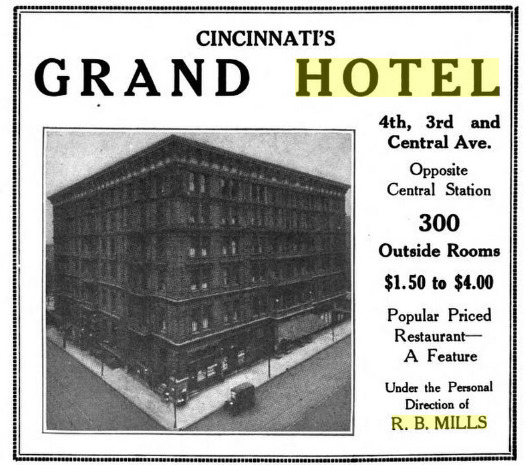
Ad for the Grand Hotel on page 566 of The Official Hotel Red Book and Directory, which was published in 1920. Also see page 568.
In 1922, he was described as the hotel proprietor and manager:

Page 615 of the Cincinnati 1922 City Directory (Cincinnati: Williams Directory Company, 1922).
And the hotel rates were described:

Page 1926 of the Cincinnati 1922 City Directory (Cincinnati: Williams Directory Company, 1922).
Rob was also, at that time, Treasurer of the Cincinnati Hotel Association:

Chilton Hotel Supply Index [Chilton Company: May 1922], p 469.
He was pictured six years later in a Cincinnati Inquirer article noting how he was elected as the general manager and president of the Grand Hotel:

Continued in part 4
© 2019-2023 Burkely Hermann. All rights reserved.
This post was originally published on WordPress in May 2019.
Notes
[10] The Hotel World: The Hotel and Travelers Journal [1920], Vol. 90, p 21, 31, 56-7, 74, 85.
#hotel management#hotels#cincinnati ohio#ohio history#mills#mills family#genealogy#family history#ancestry#20th century#wordpress#hotel industry#1920s#1920#1922#grand hotel
0 notes
Text
Bob Mills's quest to learn more about his family lineage
As I was going through some papers yesterday, I came across letters between my grandfather, Bob Mills and his uncle Theodore "Tom" Packard in 1970. Unfortunately, the letters I have are incomplete so I cannot tell the full story, but I'll do the best I can.
On September 6th, 1970, Tom Packard, living on Summit Street in Plainfield, MA wrote Bob Mills with familiarity, glad that Bob had written him as he had misplaced Bob's letter. He said he remembered Bob's father, Robert "Bert" Byron Mills II, whom had come to visit Tom's father, Cyrus W. Packard at the farm. He even recalled that Bert and another one of his friends drove the first "Interstate" car he had ever seen and remembered that Bert had "lost some fingers in an ensilage cutter." Tom even mentioned Bert's foster father, Robert "Uncle Rob" Byron Mills I, whom was in Heath with Charles Packard before he died, even coming to Plainfield to stay with Tom and his family. It was here that Bob would get a photo of Charles, Bob, Hattie, and others together, along with photos of John and Margaret Bibby, although the latter two were not within future family history Bob would write, The Packard-Mills Family History.
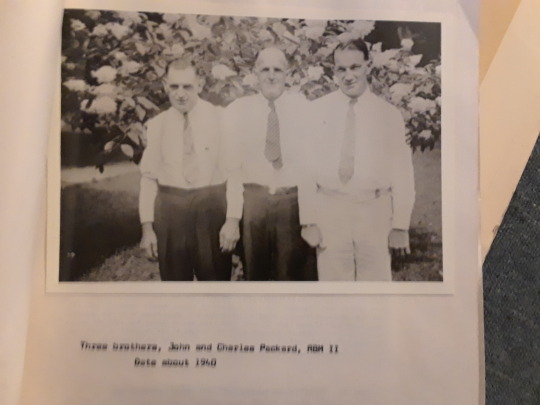
Likely the photo of John, Charles, and RBM II that Bob referred to.
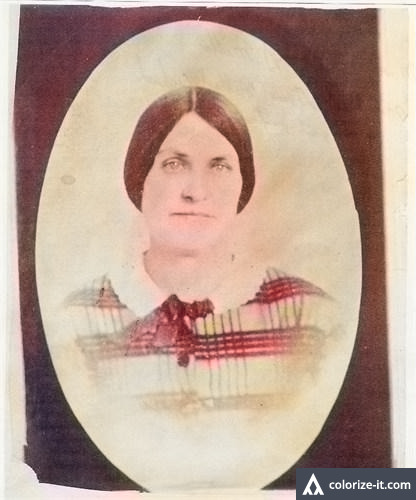
Colorized photo of Margaret Bibby, the wife of John Mills, courtesy of my sister blog, Milling 'round Ireland. This could be one of the photos Tom sent to Bob.

Photograph of John Mills, courtesy of my sister blog, Milling 'round Ireland. This could be one of the photos Tom sent to Bob.

Photograph of RBM I and Stanley, courtesy of my sister blog, Milling 'round Ireland. This could be one of the photos Tom sent to Bob.
There are varied other pictures of RBM and Hattie, so I'm not sure exactly to which ones Tom is referring to, but he clearly was more than willing to share information.
As his letter goes on, he says that his father, Cyrus, married three times, first to Nellie Mason who "died in childbirth in 1789 [sic, should be 1889] of german measles," noting that with Dora Mills he had various children, which included: John Henry (born Oct 15, 1882, died Oct 28, 1950), Margaret Alice (born Jan. 27, 1884) whom was still living by Sept 1970 and had married Kenneth Brown of Melrose, Massachusetts on September 2, 1913, having 1 daughter and 2 sons, with Kenneth dying on April 7, 1947, and Joseph Winfield (born June 17, 1885) whom was said to be "killed on railroad in Nebraska Mar. 9 1910" and was buried in Sioux City, Nebraska (a place that does not exist!). Other children of Dora and Cyrus were, he recounted, Charles Edward (born May 6, 1887 and died on Nov 4, 1960) whom married Bertha Churchill in 1919 and lived at a farm in Heath, where he and her were buried, and Marian Estelle (born Feb. 13, 1889, died June 13, 1965) whom married Edward Dean on March 23, 1908 with both living in Bridgeport, Connecticut until his death in 1954, after which she married John Nocker and was buried in West Hill cemetery.
He goes onto name a number of other children of Dora and Cyrus: Robert Byron (born Jan. 9, 1891) whom was "adopted by Uncle Robert Mills" and married Miriam Hirst on June 5, 1921, correctly noting he had Bob as his son but incorrectly said Stanley was his son (he was actually the son of Rob and Hattie), and Mable Hattie (born July 19, 1892) who married Giles Whitley (whom died in 1920) and had 2 sons and 2 daughters, later marrying Joseph Landstrom (whom died in May 1962) with whom she had five daughters, dying on December 1, 1961. He also notes that Charles married a second time after Bertha's death to Pearl Gleason in Heath, a woman whom died on Feb 1, 1956, and they had one son named Douglas E. whom lived in Shelburne Falls and they had 2 daughters, one of whom was married. For Margaret, he noted that she, at the time of the letter's writing, living with her son at 2113 Pepper Street in Burbank, California. Apart from noting that Mable Hattie, John, and Marian are buried in West Hill Cemetery, he notes there is a "stone for Joseph who was buried in Nebraska."
In the last part of his letter, he talks about the five children Cyrus, his father, had with Clementina Cheney. These are: Olive Martha (Oct. 23, 1896-Jan. 20, 1969), Herbert Miles (Oct 6, 1898-Aug. 30, 1966), Rachel May (Apr 13, 1900-Sept.22,1933), himself on May 2, 1902, and Harold Cyrus (Aug 24, 1907). The letter ends with him noting that his father died on April 2, 1924, his brother on June 27, 1923, saying he would be willing to provide further information, giving a quick sketch of the line of descent which can be visualized as: Cyrus-William Henry-Barnabas III-Barnabas II-Barnabas I-John-Zaccheus-Samuel, then saying that the Packards are "supposed to be from the Norman Family in France of Picard" and came to England with William the Conqueror in 1066. After hoping Bob would visit and write in the meantime, he ends,after his signature, by saying "I can supply adresses [sic] of other branches of the Packard Family if you wish."
On September 17th, Bob wrote back Tom with delight, saying that "both I and everyone in the family were delighted to re-establish contact with the Packards," with information Tom provided used to construct a chart of family history and fills in a lot of gaps, although he hoped any errors could be corrected.

This is the family chart Bob created. Current names and information about living individuals have been redacted
Bob's biggest question was the early life of his father, Robert "Bert" Mills (originally Packard) with his birth father, Cyrus, and mother, Dora, saying he only had vague recollections. He said that his father was apparently named after Dora's sister, Robert, and says he has "a picture of Dora and Cyrus Winfield Packard, as well as two pictures of the farm at Plainfield and these are in a family album." I don't think pictures of that farm in Plainfield and am not sure if the photos of Dora and Cyrus he references have fully survived to the present. After this he highlights how his father died on April 11, 1956 in his sleep as a victim of a stroke, had been a Fire Chief of Cheviot for almost 30 years (1926-1956?), with his mother as Miriam Esther Hirst (born on June 4, 1899), further noting that the "Hirst family were early settlers in the U.S. from England, and this family goes way back in English history." He even says that his aunt, Marjorie Hirst (Frame) was inspired by his family chart on the Packards, then setting about "trying to reconstruct a similar history of the Hirst family."
Bob continues in his letter by talking about his mother and other matters. On his mother, he notes that she died on June 18, 1961, dying from an illness of years which was "complicated by diabetes and cancer," noting that she, like RBM II, Hattie, and Stanley were all buried in Cincinnati's Spring Grove Cemetery. Interestingly, he notes that Stanley, the "only natural son of Uncle Rob and Hattie, did in 1934 at the age of 33 years from causes which have never been clear to anybody," suspecting the death from drugs, and that he never married at all. He goes onto note the three children of his parents, including himself, who was born on June 5, 1924, marrying Florence Louise "F.L." Schaefer (born August 17, 1926), meeting at Antioch College, with F.L.'s family coming from Nutley, New Jersey. He also notes his own two children of his own, which he was proud of, but I will not name them at this time as both are currently living. After this, he outlines the two other children of his mother and father, his siblings. One is Helen Eileen Mills (born August 5, 1929) who married Alex Efthim (born November 29 1916), the latter being a "large Albanian family from St. Louis," with Alex being a professor of Social Work at Detroit's Wayne State University, with them having one child. He then goes to list his sister, Carol Ruth Mills (born August 19, 1930), noting that she married Paul Edward Sieck in 1951, whom he describes as the "Vice-President of a local manufacturing concern," and have four children, two of which were adopted.
He ends his letter by writing that he and his sister Carol had been discussing possibly visiting Plainfield within the next year, possibly while skiing at nearby Berkshires. He then asks to tell more about Douglas Packard and his respective family in Shelburne Falls, along with Tom's brother, Harold Cyrus. The letter ends with "Thank you so much for your thoughtfulness."
On September 27th, Tom Packard sent a response to Bob. He doesn't have much to say about the death of Dora, saying she "did before my day" and only knows family lore, recommending that Bob write to Margaret Packard (Brown) in Burbank, California since sh was "about 11 years old when her mother died [and] she had a good memory of those matters." He adds, about Dora, that she married his father, Cyrus, in Glens Falls, New York, and that she "did here of consumption on Feb. 5, 1895." His letter goes onto note that there are various areas in the Berkshires Hills for skiiing, and adds that he owns the old farm (which "burned out in 1946") which was owned by his father, along with adjoining land. As he describes it, "the old plave [sic] still had many pleasant memories, and all the brothers and sisters always enjoyed getting back for a visit."
He concludes his letter by hoping to see Bob and his family the coming winter, and thinks they should write to Margaret. He also enclosed a photo of his father "taken a few months before he died," which he notes was from a brain tumor, and that he "was in much pain for a few weeks before he sank into a merciful comer [coma?]" while his mother "died of heart trouble the year before."
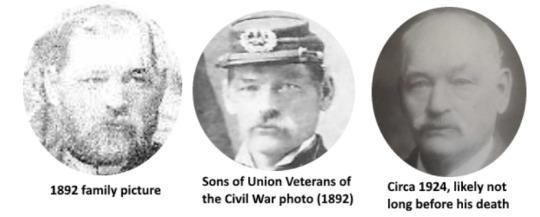
The image on the far right is from the one that Tom sent, with the others I found from other records. The full image is reprinted in The Packard Mills Family History.
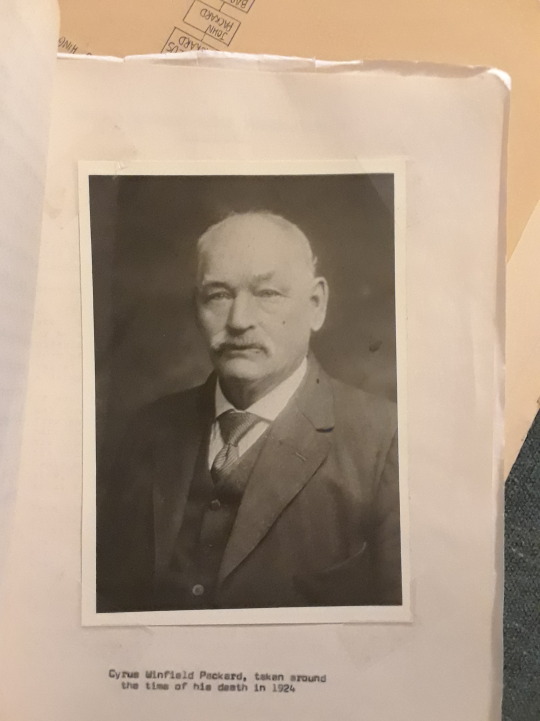
Photograph of Cyrus Packard in the Packard-Mills Family History
There are many questions from this exchange of letters? Did Carol and Bob visit Plainfield and meet with Tom? That is never known, as the next letters pick up in 1976. Further discussion of some of this topics will resume on my sister blog, Milling 'round Ireland, while others will be on this blog. Until next time!
Sources of information for this post:
Typescript letter of Tom T. Packard to Bob Mills, Sept, 6, 1970, within Family Records folder and black binder for family records.
Typescript letter of Bob Mills to Tom T. Packard, Sept. 17, 1970, within Family Records folder and black binder for family records.
Typescript letter of Tom T. Packard to Bob Mills, Sept. 27, 1970, within Family Records folder and black binder for family records.
Note: This was originally posted on Apr. 14, 2019 on the main Packed with Packards WordPress blog (it can also be found on the Wayback Machine here). My research is still ongoing, so some conclusions in this piece may change in the future.
© 2019-2022 Burkely Hermann. All rights reserved.
#packards#genealogy#family history#genealogy research#lineage#colorized#photos#20th century#nebraska#cheviot#cincinnati#nutley#nutley nj#albania#stanley sterling mills#stanley mills#plainfield#plainfield ma#massachusetts
0 notes
Text


What Remains, an 8x10 gouache painting and accompanying poem, inspired by specimen no. 7866, a Carolina Parakeet mount held in the collection of the Charleston Museum. I was able to view six preserved parakeets during my visit, but I was deeply moved by this one: in too poor of condition to be publicly displayed, stripped of feathers and provenance—its identity lost to time, just as its species has been.
Excerpted from my art book Grasping at Feathers.
(transcript and commentary under the cut.)
Shadow surrounds a doused candle,*
Forgotten at the back of a drawer.
Pot pot chee, Puzzi-la-née,**
Head-of-Yellow, once blazing:
A raucous flame that licked through summer orchards,
And set the gray boughs of winter aglow,
Warmed by the soft nuzzle of clustered wings.
All that remains is this:
A cracked and peeling thing;
An inanimate amalgam of plaster and shellac;
Flecked green with arsenic;***
Fraying feathers of faded straw.
Who is left that can remember?
That can say for certain,
That this dusty relic,
Was ever anything more?
We have lost our parrot,
Our only, only, only.
We let this wonder slip through our fingers;
What more will we forget
* I always come back to the image of the Carolina Parakeet as a candle, inspired by the Christmas tree eyewitness account.
** native Seminole names for the parakeet
*** arsenic was the first effective method found of protecting taxidermy specimens against insects, and was used expansively throughout the 19th and early 20th century. Specimens of this age should not be handled without gloves.
**** The Carolina Parakeet was America’s only native endemic parrot. The last known individual died in the Cincinnati Zoo in 1918, and the species was declared extinct in 1939.
Specimen no. 7866 is of unknown age, sex, and geographical origin. In the late 19th century, many hunter-collectors shot large quantities of birds for the purpose of selling them to museums, and in many cases records of their kills were either lost or not made in the first place. Based on my research, it is likely that this bird came from Florida in the late 1890s, but this cannot be confirmed with certainty.
294 notes
·
View notes
Text
Child labor was quite common in America deep into the 20th century. One of the most important reformist organizations was the National Child Labor Committee, created in 1904. Its leaders, many of whom were key figures in the progressive movement, understood that they would need to expose the realities of child labor in a visceral way. So they hired a photographer named Lewis Hine, whose photographs created a haunting record of American child labor.
One of the most common jobs for young boys was as a newspaper seller. Though this was not as grueling as factory work, it did have definite downsides. The day started early — here are some St. Louis newsboys beginning work at 5 am:
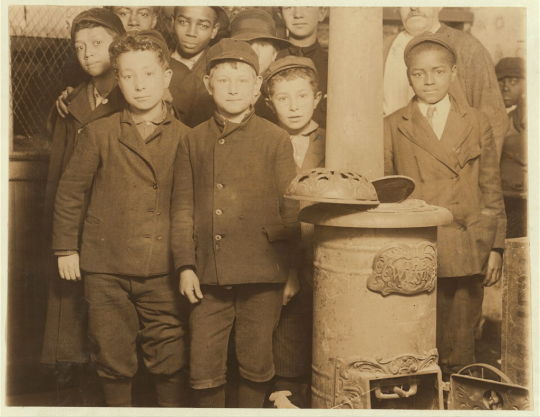
The newsboys were often exposed to bad habits on the streets:

Newspaper sellers, unlike most child laborers, did have some protections — “Newsboys’ Protective Associations” formed in many cities, and served as a sort of union and fraternal organization for the kids. Here, the Cincinnati Association is training kids in the “manly art of self-defense:”
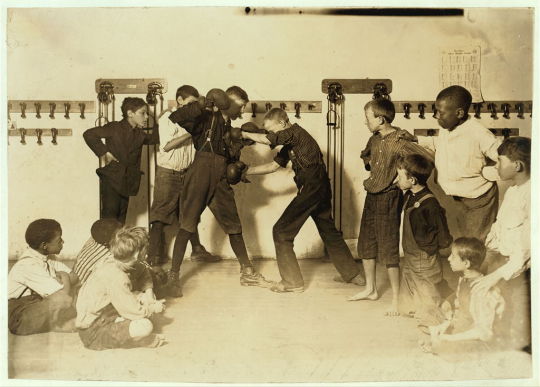
{WHF} {Ko-Fi} {Medium}
709 notes
·
View notes
Text
FITF Tour exit songs
- NA LEG - Uncasville: Tina Turner - The Best
Gilford: The Smiths - This Charming Man
Laval: Petula Clark - Downtown
Toronto: Bryan Adams - Summer Of '69
Cuyahoga Falls: The Verve - Bitter Sweet Symphony
Sterling Heights: Shed Seven - Chasing Rainbows
Cincinnati: The Killers - All These Things That I've Done
Columbus: R.E.M. - The One I Love
Indianapolis: Joy Division - Love Will Tear Us Apart
Maryland Heights (St. Louis): Chuck Berry - Johnny B. Goode
Kansas City: Van Morrison - Moondance
Milwaukee: Johnny Nash - I Can See Clearly Now
Chicago: Earth, Wind & Fire - September
Minneapolis: Sinéad O'Connor - Nothing Compares 2 U
Council Bluffs: Buzzcocks - Ever Fallen In Love (With Someone You Shouldn't've)
Sioux Falls: Don McLean - American Pie
Seattle: The Smiths - There Is A Light That Never Goes Out
Vancouver: The Police - King Of Pain
Troutdale: Elvis Presley - Always On My Mind
Berkeley: INXS - Never Tear Us Apart
Los Angeles: 2Pac - California Love
Las Vegas: The Killers - Human
Phoenix: Spear Of Destiny - Liberator
Irving: The Doors - Hello, I Love You
Austin: Wheatus - Teenage Dirtbag
Houston The Woodlands: The Police - Walking On The Moon
St. Augustine: The Police - Every Breath You Take
Hollywood: Elton John - Your Song
Tampa: Pat Benatar - Hit Me With Your Best Shot
Atlanta: The Rolling Stones - You Can't Always Get What You Want
Nashville: Duran Duran - Hold Back The Rain
Charlotte: Lou Reed - Perfect Day
Raleigh: Van Morrison - Moondance
Columbia: Commodores - Easy
Boston 1: Boston - More Than A Feeling
Boston 2: Pixies - Here Comes Your Man
Philadelphia: Sinéad O'Connor - Nothing Compares 2 U
Asbury Park: Bruce Springsteen - Dancing In The Dark
New York: Queen - We Are The Champions (dj elf asked a fan to pick between this one and David Bowie - Heroes)
- EU & UK LEG - Hamburg: Joy Division - Love Will Tear Us Apart
Copenhagen: Queen & David Bowie - Under Pressure
Oslo: Green Day - Wake Me Up When September Ends
Stockholm: The White Stripes - Seven Nation Army
Helsinki: Elvis Presley - Always On My Mind
Tallinn: Smash Mouth - All Star
Riga: AC/DC - Thunderstruck
Kaunas: Elvis Presley - Can't Help Falling in Love
Krakow: Iggy Pop - Lust For Life
Łódź: Ramones - Blitzkrieg Bop
Vienna: Oasis - Supersonic
Ljubljana: The Killers - Smile Like You Mean It
Budapest: Bloc Party - Helicopter
Bucharest: Foo Fighters - My Hero
Sofia: Rage Against The Machine - Bombtrack
Bilbao: Pixies - Where Is My Mind
Lisbon: White Lies - Farewell to the Fairground
Madrid: Editors - Munich
Barcelona: At the Drive-In - One Armed Scissor
Turin: Lenny Kravitz - Are You Gonna Go My Way
Bologna: Bloc Party - Helicopter
Luxembourg: Pixies - Where Is My Mind
Antwerp: Queens Of The Stone Age - My God Is The Sun
Paris: Biffy Clyro - Bubbles
Amsterdam: Blur - Song 2
Cologne: The Libertines - Can't Stand Me Now
Prague: Jet - Are You Gonna Be My Girl
Berlin: The Cure - Friday I'm in Love
Munich: Fatboy Slim - Praise You
Zurich: The Strokes - Last Nite
Dublin: Inhaler - These Are The Days
Sheffield: The Killers - Mr. Brightside
Manchester: The Smiths - This Charming Man
Glasgow: The Snuts - Gloria
Brighton: Ramones - I Wanna Be Sedated
Cardiff: T. Rex - 20th Century Boy
London: The Libertines - Can't Stand Me Now
Birmingham: Boyz II Men - End Of The Road
- ASIA & AUS LEG - Jakarta: Iggy Pop - Lust For Life
Melbourne: Jet - Are You Gonna Be My Girl
Brisbane: The Temper Trap - Fader
Sydney: Oasis - Rock 'N' Roll Star
- LATAM LEG - Panama: Hard-Fi - Living for the Weekend
San Juan: Pixies - Where Is My Mind
Rio de Janeiro: Nirvana - Heart-Shaped Box
Like last time the plan is to keep editing this post as tour goes on - 2022 LTWT here
Apple music playlist here
#spotify#fitf tour#exit songs#exit song#louis playlist#playlist#i dont have a consistent tag bjt that should hit it
918 notes
·
View notes
Text

Steve Harrington\Eddie Munson | Rated: M | cw: Blood, Death, Gore | Tags: Alternative Universe: Vampire, Horror, Dom/Sub undertones, Implied Mind Control, Dubious Consent, Vampire!Eddie, Hotelclerk!Steve | AO3
Previous Next
The Graveyard Shift - Part 2
They are heading northwest from their last gig in Cincinnati. The highrise of the city center quickly makes way for long stretches of road until the city is nothing more than a bunch of lights in the rearview mirror.
The guys are giddy, strung up from another good show—another good hunt. Eddie is happy to leave Ohio behind; to be returning to his home ground of Indiana.
True, the state itself isn’t much to look at, but in the darkness of the night, he doesn’t care much for a scenic view.
When was the last time he laid his eyes on the vast green fields, the rich yellow of dried wheat, or the cerulean sky? Eddie can hardly recall—it has been decades after all.
Compared to the first half of the 20th century, the 80s are a spectacle to behold. The morals are looser, the clothes more revealing, and hunting was never this easy—never this fun. Eddie likes the way he can walk around at night now, bathed in light and color like he’s living once more.
And the music is something else.
It’s hard to believe he might have missed out on this—on the leather and the smoke and the loudness of it all. The shrieking of guitars and voices that perfectly captures the chaos of the world; to instill darkness in mortals, not through death, but through music.
What a splendid age indeed.
Indianapolis shines like a beacon of light in the distance and in this new age, this time of neon lights and secondary colors, it might as well be Eden itself. It shines in darkness much more than it ever did in the light of day.
When they arrive in the city, Gareth drops him off at some gaudy hotel, and it’s their usual spiel. They stay at separate hotels, avoid suspicion, and then once their show is over, they leave again. Ditch the city and trade it for another.
Rinse and repeat, for centuries to come.
The hotel looks different from the last time Eddie stayed there a decade ago. New owners have tried to put their mark on history. Tearing down the old and replacing it with artificial plastics that seem so prevalent at this time.
It’s cute, the way they try, but few are ever remembered. Most will disappear into obscurity—just another name on a tombstone until that erodes as well.
Most, but not Eddie.
Not Corroded Coffin.
The new marble floors are laid in a checkerboard pattern—polished to such an extent that they reflect anyone who walks on them. It’s a giveaway, but Eddie doesn’t worry about that. Humans are remarkably dim; remarkably easy to fool.
Not that he minds. Eddie prefers his food a little dim.
Behind the front desk stands a boy. Eddie could smell him from outside—the smell of lifeblood and light. It matches his looks in every way. He has an easygoing charm to him.
The boy doesn’t notice him as he massages his temples and Eddie feels like a fox stalking a rabbit unaware of its impending doom.
After so many decades, it’s easy to move without sound—it’s thrilling, the way people jump, the way their eyes go wide as they grow uncomfortable.
Unconsciously they are aware that something is wrong, but humans have grown out of touch with their instincts. They push the feeling down because in this age, evil can be found in board games, books, and the wrong kind of love.
Evil comes in human form—it needs no horns or teeth or claws. It comes in clever tongues, greedy hands, and an insatiable hunger for more, m ore, m ore—
When Eddie sees the boy, he thinks goodness may persist in equal measure. It gnaws at him, the familiarity of it, but he can’t allow himself to go there—not again. It’s a specific kind of anguish. A yearning he can’t mute.
He yearns for Steve before he even learns his name.
And it sounds like a melody, the way his heart rate spikes when Eddie grabs his wrist; his scent a perfect blend of nervous curiosity and excitement, unpolluted by the stench of fear.
Eddie feels his mouth water as his nails dig into his flesh. He pulls back. He has indulged himself too much already.
Not this one. Not yet.
Around 4 AM, Eddie orders room service, and some kid with freckles shows up at his door.
Tommy
He smells like trouble—it radiates off him like perfume as his cheeks flush with expensive wine and stuffs his face with the food Eddie provides.
Call it his last supper. Eddie does have some humanity.
Eddie watches him with a lazy swirl of untouched wine in his hand. Tommy doesn’t notice he doesn’t drink. Tommy doesn’t notice much of anything.
Tommy talks.
He talks a lot and it’s all bullshit. But, fuck, if that isn’t the type of person Eddie enjoys toying with most—cocky and a little rude. They break so beautifully.
The guys have given him shit before, called his tastes fancy. And maybe they are right, just a little, because Eddie has a type.
Tommy isn’t it, but he’s close enough.
He’s sure the guys are fine with this one. Someone unreliable, who oversleeps and skips out on work. Someone who won’t be missed—not until it’s too late.
Yes, Tommy will do , Eddie reminds himself as he sinks his teeth into the boy’s neck. Tommy whimpers helplessly, somewhere between pain and pleasure. The initial resistance wears off fast as the venom fills his veins. Eddie feels his heat seep into his body and he moans against his skin; grabs the back of Tommy’s neck to pull him closer.
There’s nothing quite like blood. Nothing quite like the overwhelming pleasure of life on his tongue as Tommy’s pulse grows weaker and his skin pales.
When Eddie feels Tommy’s heart hitch he knows it’s time to stop. He pushes himself away and creates some distance as he watches. Pupils blown and white-faced, Tommy’s jaw moves helplessly for a minute or so before Eddie sees him fade.
Eddie stands up then. He hates the final spasms—hates the actual dying part, no matter how often he does it. It reminds him of himself, and how he skirted death before he became what he is now.
He moves to his window and stands in front of it. The city is alive with lights, regardless of the hour.
Reflected in the window he sees Tommy’s body give a singular violent jerk.
Death throes.
“It won’t be like last time,” Eddie whispers as he thinks of the boy named Steve.
—
It is morning and Robin is seated at their little breakfast table with a slice of half-eaten toast and a newspaper in front of her. The kitchen smells of bread and coffee and it instantly makes Steve relax. It’s the scent of coming home, especially now that he works night shifts. He makes himself a cup of tea and sits down next to her.
Robin takes another bite of her toast and looks at him. “Alright, spill it.”
“What?”
“You have something to tell me. I can see it in your face.”
Steve sends her a playful frown before pulling the two backstage passes from his breast pocket and sliding them toward her like they’re business cards.
Robin studies them a moment before looking back at Steve. “Remember when I said they were weirdos? That definitely extends to them backstage.” She pushes the passes back to Steve. “How did you even get this?”
Steve steals her toast and takes a bite. “Their lead singer—”
Robin snatches her toast back and pulls a face. “Dude, swallow before you talk.”
“Sorry.” Steve swallows heavily, “As I was saying, their lead singer is staying at the hotel. Tommy didn’t show up tonight so I had to pitch in on room service duty. Kinda sucked balls, but hey, I got something good out of it I guess.”
“And you were so good at pushing a cart this guy just happened to give you backstage passes?” Robin gulps her coffee and eyes him over her mug.
“So what if I was?”
“I don’t believe you.”
“Okay, fine. He invited me into his room and made me have wine with him. Happy now?”
“Steve, that’s really weird.” She frowns into her mug.
Steve fiddles with the handle of his mug. Robin is eying him intensely and she’s probably right. It’s a little weird, but she’s also overly suspicious. “He was just being nice. It was nearly morning. Maybe he felt guilty about the food.”
“Food? He ordered food at what, 5 AM?”
“Hotel guests are always weird. You don’t know half of it. This actually only classifies as mildly unusual.”
“So, what say you? Will you join me tonight?”
“There’s no talking you out of this, is there?”
“No chance.”
Robin seems to be giving in and Steve feels strangely victorious. “Okay, I’m coming with you tonight, if only because I’m pretty sure this guy has some unbecoming intentions with my sweet Steve.”
Steve laughs and takes a sip of his tea. Robin smiles back at him, tentatively.
“Highly unlikely. I’m not a girl.”
“That means nothing, Steve. Believe me.” Robin flips the newspaper to the next page and they sit in silence for a moment.
It’s a rainy morning and Robin will have to leave for class soon. Steve hates how their schedules contradict each other now. He squeezes her hand affectionately and gives her a reassuring smile.
“It’ll be fun.”
Robin smiles back, but it doesn’t reach her eyes.
—
“Are you really wearing that?” Robin asks him that evening.
Steve looks himself down. He’s wearing a polo and jeans. Hardly an offensive outfit. “What’s wrong with it?”
“Oh Steve, they’ll eat you alive,” she says affectionately. “Hold on.”
Robin leaves the room and Steve moves to one of the mirrors to study himself. His outfit isn’t like Eddie’s on the pamphlet, nor like the people in the record shop, but he can’t see what’s wrong with it.
“Catch.” Robin throws a black fabric ball at him and Steve turns around, just in time to get hit square in the face. He yanks it off his head and unfolds it.
“ Heart ? Isn’t it a faux pas to wear shirts of other bands?”
“I didn’t know you spoke French, monsieur Steve. Did you pick that up at that fancy hotel of yours too?” Robin is smiling at him.
Steve rolls his eyes. “It’s the cross-words okay. Now answer the question.”
“It’s fine…ish. Besides, it’s the only thing I have close to your size. It’s better than your polo, believe me.”
Steve sighs. “Fine, I’ll be right back.”
—
Robin is right, this isn’t his scene. Steve self-consciously tugs at the slightly too-tight shirt. He’s glad she made him change because people are indeed dressed differently here.
Steve hasn’t attended many music events. Music has always been in the background, not something he consciously paid attention to.
Corroded Coffin hits differently.
It’s the darkness and heat of the small concert hall. People are dressed in black and leather, drenched in defiance and sweat. But the ambiance is magnetic and it lures Steve in. It makes him believe he can become one with this collection of misfits as the drums pound in his head with Robin at his side. Guitars cut through him and Eddie Munson’s voice stitches him back together.
Robin sticks to his side, hands on his arm. She’s wary and Steve doesn’t understand how she’s not taken by this, by the music that sounds so much like love feels.
Robin eyes him suspiciously. Her eyebrows are knit together as she holds his face and scans his eyes. “Did you slip in some alcohol while I wasn’t looking?”
Steve swats her hands away. “Of course not. Where would I even get that?”
Steve isn’t drunk. He can’t be, but the atmosphere feels charged with it. “Just relax Rob, have fun,”
The music is loud and talking is hard. Bodies are squeezed against them from all sides as they make their way back into the crowd.
When Eddie announces their last song his eyes briefly meet Steve’s in the darkness of the crowd. And surely Eddie can’t see him, not really—it’s too dark and the stage lights are too bright. But when he hits his guitar and runs his lips against the metal grid of his microphone, Steve thinks he looks like a god come to life.
Steve is mesmerized by it. Can tear his eyes away from the way Eddie’s mouth moves over the microphone like a lover would. Steve hardly hears the music at this point. The world is faded at the edges and it feels like nothing exists except for Eddie and himself.
Eddie looks at him, and this time Steve is sure he sees him. Eddie’s eyes hold his, lips moving over the microphone as he sings his final note.
The crowd erupts in cheers and the spell is broken.
When the band moves off the podium, chaotic mumbling rises and fills the concert hall. The lights come back on and suddenly all intimacy seems gone.
Rob squeezes his arm, her eyes shooting towards the exit in signal for Steve. She pulls him along, making her way through the mass of bodies around him until she comes to a halt, so suddenly Steve almost crashes into her.
In front of her stands a bulky man dressed in a suit.
“If you’ll follow me,” he says. He doesn’t wait for an answer, but briefly turns his back, walking towards the stage rather than the exit.
Robin shoots Steve a wary look, but he ignores it, grabbing her by the wrist to pull her with him. She resists for a second before giving in.
The man leads them through the crowd to a door near the stage. He holds it open for them and beckons them to go through. The man steps past them until they arrive at another door. He holds it open again and when Steve walks through he is greeted by several other people lounging around.
They’re all girls.
Pretty girls with dark clothes and drinks in their hands—champagne flutes and elegant wine glasses. Some seem a little buzzed; somewhere between the softness of alcohol-induced relaxation and nervous anticipation.
The door falls shut behind them and the girls look up at the sound. They greet them, some with a soft ‘hi’, others with a wave. Some of them ignore them altogether.
Steve doesn’t really care. He isn’t there for them. The girls don’t seem to care either—mostly focusing on themselves or the friends they brought.
“Let's get out of here Steve,” Robin whispers in his ear. She’s glued to his side, antsy to get away, and Steve has to admit the situation feels strange. Now he’s not engulfed by the crowd the high is starting to wear off, and the atmosphere unsettles him a little.
The room is pretty barebones and all the girls are wearing VIP tags around their necks, just like them.
“Let's just get one drink, then we’ll go.” Steve offers. He makes his way over to a table with various drinks—mostly alcohol. Steve decides to be responsible and grabs a soda for Robin and himself. Robin seems nervous enough as is, she doesn’t need Steve’s drunk ass on top of everything.
A little while later the man who led them earlier is back and asks them to follow him once again. Muffled music sounds throughout the hall until a door opens and suddenly music is blasting.
The room is dark with a few lights scattered around casting warm light and dark shadows. The room is hazy with smoke, walls lined with brick, and Persian rugs scattered on the hardwood floor. It must be one of the rooms for performers to relax before and after the show, Steve realizes.
Loud cheering erupts as one of the band members downs a glass of red liquid in one go. Some of it runs past his stubbled chin and he wipes at it with his sleeve.
The large man clears his throat and the band members look up towards the door opening.
“Come in, come in!” A guy with blond curly hair motions. They disperse and the members seem to gravitate towards their respective guests.
“Steve!”
Eddie walks towards him with open arms and Steve feels that familiar pull again. It tugs at his mind and swirls in his gut with a sense of unfounded longing.
Before Steve can react, Eddie has him engulfed in a tight hug and Steve can feel the buttons of his denim vest dig into his chest and the skin of his cold bare arms stick to his own sweat-slick skin.
“And you must be his friend.” Eddie releases him and turns to Robin. He doesn’t hug her. Instead, he takes her hand with a cordial bow and introduces himself as ‘Edward Munson, but call me Eddie’.
The tension in Robin’s posture seems to relax a little then. “Robin,” she says.
Eddie’s attention turns back to Steve and he eyes him up and down.
“Dig the shirt,” he says, clicking his tongue. Steve looks down at the tight fabric stretched over his chest and pats at it self-consciously.
“What did you think of the show?” Eddie looks at Robin, then at Steve.
“It—it was great. I’ve never seen anything like it,” Steve says. Next to him, he sees Robin’s eyebrow move ever so slightly. It’s a tell, but Eddie won’t know that. Robin thinks Steve’s full of shit. Is probably judging his life choices at this very second. That’s fair. Maybe Robin is just having a bad day.
“Great show,” Robin echoes, but there is little passion behind her words. She looks at her watch, and honestly, Steve thinks it’s a little rude with Eddie right in front of them, but Eddie doesn’t seem to notice. His eyes are glued to Steve. A handsome little smile growing on his face as he throws an arm around his shoulder.
“Say, we’re heading to a club after this. Afterparty kinda deal. Care to join us?”
Steve opens his mouth to answer, but Robin beats him to it.
“We have class tomorrow morning.”
We. Now that was a lie. Robin really wants to get him out of here.
“I don’t,” Steve corrects her, “An after-party sounds fun. Can’t sleep anyway—night shifts you know.” Steve shrugs.
Robin shoots him a desperate look. “Can I steal him for a moment?” She asks Eddie. He nods and releases his grip on Steve’s shoulder.
Robin leads him to one of the corners of the room. The music is loud, and the other band members are chattering with the girls. One of them has a girl on his lap as they engage in a very intimate conversation.
Once they’re out of earshot, Steve focuses his attention on Robin. “What the hell, Rob!”
“Steve, something about this is off. I swear.”
“Don’t be ridiculous,” Steve says, but it doesn’t sound convincing. Robin quirks a skeptical eyebrow as she folds her arms over her chest.
The thing is, Steve doesn’t really care. This is the most fun he’s had in a good while. Life has been boring these past few months. He is just finding his footing again after Nancy dumped him. He doesn’t understand why Robin can’t let him have this.
“Steve, I mean it. I’m going home. I really do have class in the morning. If you know what’s good for you, you will come as well.”
“I’m staying, Rob. I can take care of myself.” He crosses his arms over his chest and stares her down.
Finally, Robin relents. She sighs, pulls the VIP badge from her neck, and shoves it in his hand.
“If you’re about to do something stupid, look at my name and maybe—don’t do that thing,” she says. She gives his arm an affectionate squeeze and makes her way to the door, looking back once with furrowed brows before closing it behind her.
Steve stares after her. His excitement tainted with a strange guilt as he stands there alone.
“You alright there?”
Steve turns around and sees Eddie looking at him with worried eyes.
“Yeah, I’m fine. My friend—” he looks at the door again and frowns, “she had to leave.”
“That’s too bad, man. Listen, we’re about to head out, yeah. I got us a taxi, we’re sharing with Gareth and his harem.” Eddie points a thumb over his shoulder towards the guy with curly blond hair. He’s surrounded by three girls.
Steve shoots him a smile, and when he stares into Eddie’s impossibly dark eyes, he feels all guilt wash off him and that strange sense of longing and anticipation return.
The taxi is a tight squeeze. One of the girls takes the passenger seat, which leaves Eddie, Gareth, and two additional girls in the backseat.
A blonde girl decides to share a seat with her friend by sitting on her lap and Gareth squeezes himself into the middle seat next to the girls. That only leaves one window seat.
“Not a bad idea,” Eddie says, staring at the girls, “you can sit on my lap,” he offers, sending him a little smile. Steve laughs sheepishly until he realizes Eddie meant what he said.
“Won’t you be uncomfortable? Maybe we should get another taxi—”
“It’s only ten minutes. It will be fine,” Eddie waves his hands.
Steve relents and settles himself into Eddie’s lap. They’re both guys, it isn’t weird at all. He was on the basketball team in high school. He knows guys can be close without it having to mean something. Maybe if he were a girl, he would be worried.
Somewhere in the back of his head, he hears their morning conversation echo.
‘That means nothing, Steve. Believe me.’
He shakes her off, even when he feels her VIP pass poke into his thigh from the pocket of his jeans.
The car ceiling is low, and he has to bend his neck a little with the added height of Eddie’s thighs beneath him. There’s no shifting or moving about. He sits planted firmly, full weight on Eddie’s lap. They can’t wear a seatbelt like this, which annoys him somewhat. It thrills him too, the edge of danger, however small.
Everything about tonight is strange and exciting.
The car ride is short indeed. He feels Eddie’s bones dig into the back of his legs, and Eddie holds him, arms wrapped around his waist, but it’s only to steady him. Steve tries not to move too much. He doesn’t want to make it more uncomfortable for Eddie than it has to be. It’s a tight squeeze as is, with all five of them on the backseat, and it doesn’t help that Gareth keeps messing with the girls on his side. His elbows poke into Steve’s side now and then, and it makes him shift in Eddie’s lap.
“We’re almost there,” Eddie breathes against his neck. Steve feels the hairs on the back of his neck stand up. His will is soft and pliant and he feels like he’s drunk again. He wonders how Eddie’s doing that; wonders why Eddie even invited him along when he could be surrounded by a cohort of girls as well, although he loses that train of thought quickly.
Steve stumbles out of the taxi once they arrive, and Eddie steadies him when he steps out behind him. There’s a large line in front of the building—so long that it cuts around the corner— and Steve can only imagine how long it will go on from there.
The red neon sign spells out ‘Candlelight’ and it casts a warm hue on the concrete sidewalk. It makes Eddie’s hair look a deep auburn and fire-red reflect in his black eyes.
Steve hasn’t been to many nightclubs in Indianapolis. Before, when he was dating Nancy, there was little reason to, and now that he has his job at the hotel, his nights are often otherwise preoccupied. Robin indulged him once after he and Nance broke up, but after getting hit on by several guys, she quickly decided she never wanted to do it again.
Not that it matters. Steve liked spending whatever free night he had watching movies with Robin just fine. And he would like to meet his next girlfriend organically anyway, not in nightclubs through beer goggles or whatever.
Their entourage is moving towards the double doors of the nightclub and Eddie lays a heavy hand on his lower back. He feels his fingers grace his skin where his shirt rides up; feels Eddie’s sharp nails rest on his skin like talons. It sends a shiver down his spine.
Once one of the other guys talked to the bouncer, they’re allowed in, and Steve is a little starstruck by the way they get to skip the line.
As they walk through the double doors, Steve is engulfed by light and moving bodies to music that thumps so loudly he can feel it in his bones.
A strange night indeed, he thinks as Eddie guides him in.
---
@shunna
@bookworm0690
@stripey82
@sexymothmanincarnate
@gaydrieeen
@ilovecupcakesandtea
@hiscrimsonangel
@eddie-munson-addict
@limpingpenguin
@bloodrising
@dotdot-wierdlife
@wheneverfeasible
@cryptid-syste
@lawrencebshoggoth
@scoops-aboy86
@ignoremyworld
Please leave a comment or send me a message if you wish to be included/removed from the taglist for this fic.
#steddie#steve x eddie#eddie x steve#eddie munson#steve harrington#steddie fic#steddie horror#steddie au#vampire!eddie munson#hotelclerk!steve#thegraveyardshift#my fics#ster writes steddie#TGS
53 notes
·
View notes
Note
Hi, I was looking something up and thought you might like to know, if you didn't already- at one point in the mid-20th century there were so many Appalachians migrating to cities for work that Cincinnati saw fit to make it illegal to discriminate against people of Appalachian origin (and even had to maintain a document of counties in the Eastern US which counted as "Appalachian origin" lol). I suppose people's dialect was causing them to be discriminated against so harshly that something had to be done about it. As someone bred in Appalachia who lived in Cincinnati for a few years as a child and has family there still, in find it interesting.
holy shit! i had no idea!
Sec. 914-1-A1. - Appalachian Regional Origin.
"Appalachian regional origin" shall mean birth or ancestral origin from that area of the eastern United States consisting of the counties listed in an Appalachian Regional Origin Document which shall be maintained on file with the Clerk of Council.
(Ordained by Ord. No. 490-1992, eff. April 7, 1995)
i find this incredibly interesting, and also kinda validating. like, just the way we talk is such a barrier in people taking us seriously, and once, it was so blatantly apparent that an actual law was enacted to stop it? whoa.
i was reading a little more about it and found this really interesting article about appalachian dialect/discrimination from the appalachian journal of law!
Perhaps most noteworthy, their culture honors the oral tradition.[6] They find pride in their speech. In fact, the very way Appalachians speak is directly tied to their heritage and sense of identity.[7] Accent serves as an identifier for other Appalachians, i.e., the insider group, and outsider groups, i.e., non-Appalachians.[8]
Despite their cultural distinction, Appalachians are a forgotten, invisible minority, in part, because it is their accents, rather than their physical appearance, in which they differ from mainstream Americans.[9]
However, language is “a powerful automatic signaling device second only to race to identify targets for possible privilege or discrimination.”[10] Like other minority groups, Appalachians have had their identity stolen and manipulated by outsiders.[11]
The Appalachian accent, known by some as “mountain speak,” has been interpreted as signaling undesirable and distorted traits. Appalachians are routinely stereotyped as “ignorant, lazy, uneducated, and incestuous . . . .”[12]
Appalachian linguistic differences have led to economically harmful discrimination.[13] In fact, “Appalachians are statistically one of the most exploited and marginalized [sic] groups in America.”[14] However, courts have refused to protect them from hate-fueled and egregious discrimination.
a snippet of the intro. its so validating, all of this official conversation on it?
thanks so much for bringing the notion to my attention omg <3
34 notes
·
View notes
Text
On this day... - April 20th
On this day Led Zeppelin performed:
+ 1977 : Riverfront Coliseum in Cincinnati, Ohio, USA
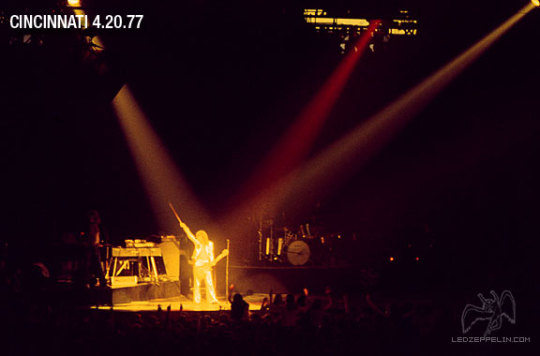


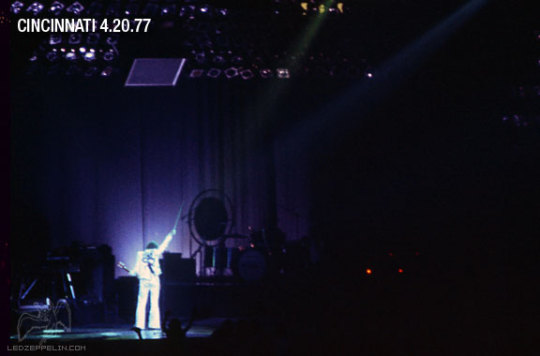
“Led Zeppelin brought the power and the glory of British blues-rock to Cincinnati. The sheer energy of the affair was infectious. […] Even before they played any music they were hypnotizing. […] For three and a half hours, the fans who had come to see Plant strut and hear the stunning range of his voice were not disappointed: at times, he seemed to fill the hall. […]Even as the perpetrators themselves were speeding away from the scene, the 19000 witnesses were left standing and roaring their approval for their share of what will surely be remembered as the rock and roll event of the century: the 1977 Led Zeppelin American Tour. It is, truly, what Robert Plant had promised last winter in a Rolling Stone piece: “thunder, lightning and the hammer of the Gods.” – ‘The power and the glory: Led Zeppelin fills Riverfront with supreme rock and roll’ by Chas Main (Arts & Entertainment)
#on this day#led zeppelin#robert plant#jimmy page#john paul jones#john bonham#classic rock#ourshadowstallerthanoursoul
20 notes
·
View notes
Text

Tunnleton
This is a westbound Baltimore & Ohio train moving through the East Fork White River Valley in southern Indiana. The small burg of Tunnleton lies above the tracks on the hill.
This B&O line, between Cincinnati and St. Louis, began life as the Ohio & Mississippi. Apparently, the town was created in the mid-1850s when the line was being built—it lies halfway between Big Tunnel and Little Tunnel. The former still exists while the latter was daylighted just prior to the turn of the 20th century.
While this is the B&O, the motive power is of the Chesapeake & Ohio, part of the Chessie System. Both appear to be SD40s.
Image by Richard Koenig; taken October 28th 1977.
#railroadhistory#railwayhistory#b&o#c&o#baltimore&ohiorailroad#chessiesystem#tunneltonindiana#tunneltonin#tunnleton#chesapeake&ohio
45 notes
·
View notes
Text
One of the great tragedies of the Rust Belt* is that it did not define itself as a distinct cultural region until well after its great era of flourishing was over. For the century from about 1850-1950, this area was not merely the industrial heart of the nation, but also its cultural center. And yet the inhabitants of the area, if they thought of themselves as having a regional identity at all, it was as inhabitants of the generic ‘north’. Its status as a center of cultural innovation was pooh-poohed by the fact that the nation’s political and intellectual elite was, even as it is today, strongly based to the coastal northeast, and this Eurocentric elite had a very different set of priorities than the cultural avant-garde of the as-yet-unRusted-Belt. This area produced little in the way of ‘high art’ in the expected form of novels, symphonies, and oil paintings. But what it did produce...
In 1900, Chicago was the occult capital of the nation, a hotbed of wild theorizing and underground publishing of all manner of Theosophical weirdness. Meanwhile, Louis Sullivan and Frank Lloyd Wright were producing the first wholly indigenous tradition of monumental architecture, setting a pattern for all of urban modernity. The Dayton, Ohio based Wright brothers - often abused in pop-historiography as some sort of rude mechanicals - were slowly and methodically systematizing the science of aerodynamics in preparation for the first ever instance of heaver-than-air flight in human history, with world-shaking consequences. And up in Detroit, Henry Ford was not merely revolutionizing transportation and manufacturing, but setting a standard for industrial relations that would create an unbelievably influential model for decades to come. It might sound strange to modern ears to cite Henry Ford as a bleeding-edge figure, but Fordism served as an inspiration to both Bolsheviks and Fascists, as well as to domestic New Dealers, while simultaneously pleasing and alarming old-fashioned Anglo liberals. The Long 20th Century is a series of footnotes to the Rust Belt Golden Age.
As can be seen from this too-brief summary of the luminaries of the epoch, it was a deeply unique Golden Age, characterized by cultural traits all its own. Technical prowess, utopian visions, and thorough systematization were its characteristics, as was a sense that a lone individual or small group could, through sheer innovative genius, change the world. While the archetype of the Mad Scientist is based on Mitteleuropean models, it was here in Mittelamerika that it achieved its apotheosis. The definitive cultural history of this region and era has yet to be written**, which just shows how underappreciated the underlying unity still is, but it in a large part contributed to the dynamic optimism that we all now take for granted as distinctively ‘American.’ But as the area felt the collapse of the long bubble economy that funded its flourishing, and its brightest sons and daughters fled west to contribute to the explosion of creativity along the Pacific slope that is now likewise collapsing, it finally awakened to a sense of unity that had previously been hidden by arbitrary State boundaries.
That, at some point, this area will again be the center of some sort of vigorous culture seems an inevitability of human geography, but will it again share the same features of optimism and technical prowess, or were those mere incidental features of a bunch of people with a Protestant work ethic suddenly getting access to the tremendous wealth provided by a vast agricultural base + fossil fuels? Man alive, I don’t have the slightest clue, but I hope that there is some sort of afterlife or metempsychosis so I can find out.
* here roughly defined as the geographical area constrained by an irregular polygon whose points are Syracuse, Pittsburgh, Cincinnati, St. Louis, Davenport, Green Bay, and Flint.
** unless it has and i’m just ignorant of it, in which case please let me know so i can rest easy that i don’t need to do any work and can just sit down and read the thing. honestly, even tangentially related book recommendations are appreciated.
97 notes
·
View notes
Text
Uncle Rob and the hotel business [part 2]
Continued from part 1
The following year, 1907, he was said to be working at the Hunts Hotel in Cincinnati. [2] Three years later, Rob and the rest of his family "would all be living at the Hotel Sterling." The following year, he was described as "formerly of Hotel Bennett, Binghamton, N. Y., and Grand Hotel, New York City." It was around that time that Reverend Charles Frederic Goss wrote a biography of Rob for his book in Cincinnati. By 1917, he was appointed manager of the back part of the Hotel Gibson in Cincinnati, working with W.E. Hawk, the assistant manager. [3]
Two years later, in 1919, there was an article in The Hotel World about Rob, working at the Grand Hotel in Cincinnati who had been recently elected to the hotel directorate after being a manager of the hotel for "several years," even a new vice-president of the Ohio State Hotel Association. [4] He outlined some of the "most essential" elements of hotels, in order to make them "efficient," in a letter to employees where he explained a bonus system, writing in a manner that somewhat reflects bosses in the corporate world today, the "corporate pursuit of happiness" as one article a few years ago called it:
The most essential items in the conduct of a hotel are courtesy, the elimination of waste, and faithful attention to one's work by putting forth our best efforts. Think what it would mean if our force of 125 people [at the Grand Hotel] all set out to be courteous to the guests and to one another, cut out all waste--which means turning out lights when not needed, turning off water, saving soap, stationary of all kinds, heat, coal, steam linen, butter, cream, sugar, matches, time and many other things. The directors have put us in charge of this hotel and we can make it just what we wish. We can fill the hotel to capacity every day by being courteous, alert, and giving quick, careful attention to service. Then, if each one of us is a committee of one to boost and smile, we will get the new rooms, and if we get them, we will fill them. Be thoughtful of noise in the falls at all times and especially in the morning. People often retire late and want a little beauty sleep until about 8 or 9 in the morning. The dining room is a touchy institution and requires the closest study, and courtesy always wins there. One thing which we should be careful about is to watch the patrons when they come in the dining room door and be sure to seat them. If the head waiter is busy elsewhere or if his attention is taken up, the other waiters should take it upon themselves to see that the guest receives the proper attention....Let us all get the habit to make the Grand Hotel one bright spot, and one year from now take account of stock and see if it pays.
These views were no surprise, as the previous year, the Grand Hotel, called "one of Cincinnati's older hostelries," was being remodeled with addition of thirty guest rooms and a number of baths, with Rob "placed in charge of the hotel" after being joint manager of the Hotel Gibson. [5] Elsewhere he was described as one of the "prominent people" in the hotel industry, as the previous "co-manager of the Hotel Gibson" with W.E. Hawk in Cincinnati. With this, it was noted as taking "management of the Hotel Grand in that city," [6]
By the 1920s, he was providing a space for a group called the Cincinnati Carriage Makers' Club to meet, even addressing them at their meeting in May 1920 [7]. The hotel orchestra even played for this group. As it turns out, this group was made up of those whom tried to sell their horseless carriages, dreaming up passenger vehicles in the early 20th century. Most of the articles on them, including from webpages on the Carriage Museum of America's website focus on their role in the 1880s or 1890s. By 1917, they, part of the Carriage Builders National Association, seemed to be in the business of selling vehicles of some kind [8], while also talking about automobiles, that looked like:
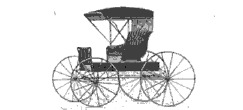


Left to right: First image courtesy of the Spokesman and Harness World, Vol. 33, p 84. Second image courtesy of the Spokesman and Harness World, Vol. 33, 194. Third image courtesy of The Spokesman and Harness World, Vol. 33, 195.
This post was originally published on WordPress in May 2019.
It did seem they were still focused on horse-drawn carriages as well, as in the name "carriage." By 1920, The Spokesman and Harness World declared that not only was the Carriage, Harness, and Accessory Travelings Salesman's Association of the United States (C.H.A.T.) based in Cincinnati, but it included companies like Firestone Tire & Rubber, and undoubtedly involved the automobile business, with prospects for "greater business...for the wagon and buggy business in Cincinnati" in 1920. [9]
© 2019-2023 Burkely Hermann. All rights reserved.
continued in part 3
Notes
[2] Executive Documents: Annual Reports ... Made to the ... General Assembly of the State of Ohio ..., Part 2 [Ohio, 1907], p 922; Ohio Dept. of Inspection of Workshops, Factories and Public Buildings, Annual Report of the Department of Inspection of Workshops, Factories and Public Buildings, to the General Assembly of the State of Ohio, for the Year 1907 [Office Chief State Inspector of Workshops and Factories, 1907], Vol. 23, p 72].
[3] Hotel Monthly [J. Willy, 1917], Vol. 25, p 4.
[4] The Hotel World: The Hotel and Travelers Journal (1919), Vol. 88, p 62, 68, 73, 97; the article was titled "Essential Items in Conduct of Hotels: Courtesy and Elimination of Waste Emphasized by R.B. Mills."
[5] "Cincinnati and Vicinity," Domestic Engineering and the Journal of Mechanical Contracting [1918], Vol. 83, p 32.
[6]The Hotel World: The Hotel and Travelers Journal [1918], Vol. 86, p 70.
[7] Motor Body, Paint and Trim [May 1920], Vol. 56, p 54.
[8] The Spokesman and Harness World [Spokesman Publishing Company, 1917], Volume 33, p 64, 163-9.
[9] The Spokesman and Harness World [Cincinnati: Spokesman Publishing Company, 1920], Vol. 36, p 26-7, 30, 39, 59, 76, 83, 93, 95, 103, 117, 125, 159.
#mills family#mills#cincinnati ohio#ohio history#hotels#hotel management#grand hotel#1920s#1910s#carriages#horseless carriages#wordpress#genealogy#ancestry#family history#20th century
1 note
·
View note
Text

Delilah Leonium Beasley (September 9, 1867 - August 18, 1934) pioneering reporter and historian was born in Cincinnati. She attended the city’s segregated public schools and by her teenage years, started publishing short social reports on the African American community for both the local African American newspaper and the white newspaper. Her parents’ deaths sometime during the 1880s forced her to put her journalism interests on hold.
She sought employment that would provide her a living and a modicum of respectability, quite a challenge for African American women in those years. Working as a personal maid for white women, she trained as a hairdresser and as a massage therapist specializing in nursing care. By the early 20th century, she settled in Oakland, working as a nurse and maid while immersing herself in African American history and the African American women’s club network. Soon she was writing special columns on African American community activities for the local newspapers, including the Oakland Tribune and the African American Oakland Sunshine. Her interest in history led her to write other articles documenting the history of California’s African American population, and she trained herself in the practices of the emerging historical profession—including archival research, tracking down diaries and personal papers, and even doing oral histories with older black residents. In 1919, she self-published The Negro Trail Blazers of California, a study that provided rich detail of African American pioneers dating back to the Spanish exploration of the region. Historian Elsa Barkley Brown described her innovative history as not only centered on the “everyday” African American experience in California but on the strong roles of African American women in the region.
She continued to write and participate in African American women’s club activities and the local chapter of the NAACP. She died after years of ill health brought on by poverty and overwork. Her writings remain among the critical sources for both African American California and African American women’s history. #africanhistory365 #africanexcellence
3 notes
·
View notes







